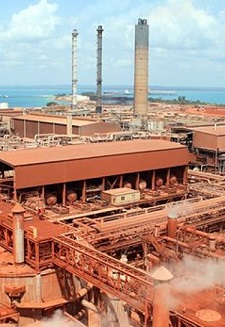Rio ditching Indigenous agreement to dig out of losses
 One mining firm has defended its move to close an aluminium refinery in the Northern Territory, but the AWU says it may legally have to keep the doors open.
One mining firm has defended its move to close an aluminium refinery in the Northern Territory, but the AWU says it may legally have to keep the doors open.
Rio Tinto’s plans to shut its Gove alumina refinery in NT will shatter local lives and the future for the region, according to workers and union representatives. There may now be an additional issue for the company as it tries to cut costs, with an old agreement dug up and put on the table.
Paul Howes from the Australian Workers Union (AWU) says Rio has signed an agreement in its leasing terms, stating that it must keep the refinery open if it wants to keep mining bauxite at a nearby operation.
The agreement was made with the traditional owners of the land to ensure future employment for nearby residents. Many of the refinery’s 1,400 staff live in the nearby town of Nhulunbuy, which survives almost solely on the economic benefit of their wages.
Announcing the shut-down last week, Rio chief executive Sam Walsh said: “it has been an extremely difficult decision and we recognise it will have significant impact on our employees, the local community and the Northern Territory.”
The closure is reportedly a result of less-than-booming alumina prices and the high exchange rate, but Mr Howes says the company should weather the storm for the sake of over 1000 employees at the site.
“Rio's casual abandonment of an entire town due to short term market conditions is a complete disgrace. While the AWU doesn't doubt for a second that tough conditions exist, those conditions will - inevitably - change over time,” Howes said.
“We are talking about an entire town being destroyed here, $500 million wiped from the economy, and some of the most effective Indigenous employment and training programs in the country wiped out.”
The AWU has reportedly lodged a Freedom of Information request for a copy of the agreement between Rio, the traditional owners and the NT government in 2011.
“I don't believe for a second that we are getting the full story on how this whole operation has been allowed to fall apart, but I am determined to get it,” Howes said.
“Why hasn't legal action commenced, why haven't injunctions been put in place to stop the shutdown of the refinery?” Howe asked after meeting with NT Chief Minister Adam Giles.
“Why is Rio Tinto allowed to breach the terms of their lease agreement with the traditional owners?”
The possibility of a legal challenge to the closure is now unfolding.
Meanwhile, Rio Tinto has remained aloof, choosing not to dwell on the situation at a recent address to shareholders.
“I have set a clear direction for the business to reignite our passion for delivering greater value for shareholders,” Rio Tinto chief executive, Sam Walsh, said.
“Our results so far show we are taking decisive action, making tough decisions and advancing at pace.”
He says he is confident the company will increase its profitability, but it appears that will come at a cost to the people of the Northern Territory and Nhulunbuy in particular.
“Over the longer term, I remain optimistic about demand for our products. China’s urbanisation will continue and the development of other economies as they continue to grow at pace, such as India, Vietnam, Indonesia, the Philippines, the Middle East, the former Soviet Union, South America and Africa, will also contribute to ongoing demand for our products,” Walsh said.
“In China, the decisions from the government’s Third Plenary Session last month reflect an ambitious yet pragmatic approach to continued reform and confirmed our expectations of gradual change... which reduces the likelihood of a sudden downturn.”








 Print
Print